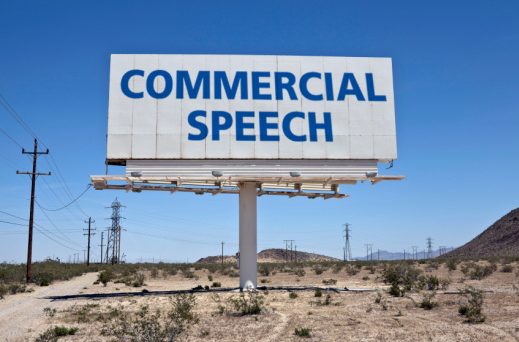 Richardson Business Center proved an easement by estoppel, and appealed the trial court’s decision to not award attorneys’ fees for its successful declaratory-judgment action. However: “The trial court did not file findings of fact or conclusions of law. Without findings of fact establishing the basis for the trial court’s exercise of discretion, we cannot conclude as a matter of law that the trial court abused its discretion in declining to award attorney’s fees.” Hazzani v. Richardson Business Center, No. 05-18-00346-CV (July 21, 2019) (mem. op.)
Richardson Business Center proved an easement by estoppel, and appealed the trial court’s decision to not award attorneys’ fees for its successful declaratory-judgment action. However: “The trial court did not file findings of fact or conclusions of law. Without findings of fact establishing the basis for the trial court’s exercise of discretion, we cannot conclude as a matter of law that the trial court abused its discretion in declining to award attorney’s fees.” Hazzani v. Richardson Business Center, No. 05-18-00346-CV (July 21, 2019) (mem. op.)
Monthly Archives: July 2019
 The Mian Devel. Corp. v. State of Texas involved an epic “battle of the experts” arising from the condemnation of some parking for the Sterling Hotel, a large hotel complex on I-35 near downtown Dallas. The hotel’s owners offered experts calculating compensation of $13,600,101 or $19,100,000; the State offered experts calculating compensation at $1,027,927 or $764,970, and also called an expert who said the Sterling was an unviable business. The jury awarded damages of $1,186,350 and the owner appealed. The Fifth Court affirmed in a detailed review of these experts’ testimony, discussing, inter alia: (1) the line between unreliable methodology (admissibility) and material for cross-examination (weight) (pages 10-11); (2) the concept and legal definition of fair market value (page 13); (3) five evidentiary issues about objecting to discussion of material relied upon by an expert (pages 18-19); and (4) throughout, the accepted methodologies and data resources used in this area of law. No. 05-17-01385-CV (July 18, 2019) (mem. op.).
The Mian Devel. Corp. v. State of Texas involved an epic “battle of the experts” arising from the condemnation of some parking for the Sterling Hotel, a large hotel complex on I-35 near downtown Dallas. The hotel’s owners offered experts calculating compensation of $13,600,101 or $19,100,000; the State offered experts calculating compensation at $1,027,927 or $764,970, and also called an expert who said the Sterling was an unviable business. The jury awarded damages of $1,186,350 and the owner appealed. The Fifth Court affirmed in a detailed review of these experts’ testimony, discussing, inter alia: (1) the line between unreliable methodology (admissibility) and material for cross-examination (weight) (pages 10-11); (2) the concept and legal definition of fair market value (page 13); (3) five evidentiary issues about objecting to discussion of material relied upon by an expert (pages 18-19); and (4) throughout, the accepted methodologies and data resources used in this area of law. No. 05-17-01385-CV (July 18, 2019) (mem. op.).
 July 19 is notable as the birthday of Samuel Colt, and as the day the Fifth Court gave two clean examples of when mandamus is, and is not, available:
July 19 is notable as the birthday of Samuel Colt, and as the day the Fifth Court gave two clean examples of when mandamus is, and is not, available:
- YES. The trial court granted a motion to reinstate after the expiration of plenary power. The Fifth Court granted the writ “instanter” in this situation, since the trial court’s lack of jurisdiction was established with certainty. In re Southern Management, No. 05-19-00653-CV (July 19, 2019) (mem. op.)
- NO. The trial court declined to find certain materials were confidential and thus covered by its protective order–a topic as to which the Fifth Court “afford[s] the trial court broad discretion” and requires “facts showing a particular, specific, and demonstrable injury” and “detailed information to support its claim of privilege or confidentiality.” In re Toyota, No. 05-19-00030-CV (July 19, 2019) (mem. op.)
 In an artful scramble to avoid Dyer v Medoc Health Services, 573 S.W.3d 418, 424 (Tex. App.–Dallas 2019, pet. denied), the movant abandoned the argument that the relevant business communications dealt with “a matter of public concern,” and instead focused on whether the communications were in connection with “a good, product, or service in the marketplace” — namely, workplace complaints about the plaintiff. The panel majority was not persuaded, concluding that “[t]he allegations against Damonte clearly are not based on, related to, or in response to conversations Damonte purportedly had with employees about problems they were having with the company,” and that “nothing in Hallmark’s lawsuit suggests are predicated on anything other than Damonte’s alleged involvement in a scheme to misappropriate and use Hallmark’s confidential information.” A concurrence cautioned that “[t]he majority opinion should not be construed to mean the content of the communication at issue must itself be defamatory or actionable” to be actionable. No. 05-18-00874-CV (July 12, 2019) (mem. op.)
In an artful scramble to avoid Dyer v Medoc Health Services, 573 S.W.3d 418, 424 (Tex. App.–Dallas 2019, pet. denied), the movant abandoned the argument that the relevant business communications dealt with “a matter of public concern,” and instead focused on whether the communications were in connection with “a good, product, or service in the marketplace” — namely, workplace complaints about the plaintiff. The panel majority was not persuaded, concluding that “[t]he allegations against Damonte clearly are not based on, related to, or in response to conversations Damonte purportedly had with employees about problems they were having with the company,” and that “nothing in Hallmark’s lawsuit suggests are predicated on anything other than Damonte’s alleged involvement in a scheme to misappropriate and use Hallmark’s confidential information.” A concurrence cautioned that “[t]he majority opinion should not be construed to mean the content of the communication at issue must itself be defamatory or actionable” to be actionable. No. 05-18-00874-CV (July 12, 2019) (mem. op.)
On June 28, the Texas Supreme Court denied the petition for review in Dyer v. Medoc Health Services, 573 S.W.3d 418 (Tex. App.–Dallas 2019), soldifying the foundation for several recent opinions from the Fifth Court that have limited the reach of the TCPA.
 In Clean Energy v. Trillium Transportation Fuels, No. 05-18-01228-CV (July 9, 2019) (mem. op.), the Fifth Court applied the “commercial speech” exemption to communications made by Clean Energy, reasoning: “Clean Energy sent unsolicited emails to Trillium’s customers, indicated Trillium’s prices were too high, and attempted to meet with Trillium’s customers to ‘present our renewable CNG offering and support services’ and discuss ‘what we could do today.’ The fact that the emails do not provide specific details about Clean Energy’s pricing or business proposal does not mean the emails are not about Clean Energy’s goods and services. Because part of Clean Energy’s communications involves its goods and services, [Dickens v. Jason C. Webster, P.C., No. 05-17-00423-CV, 2018 WL 6839568 (Tex. App.–Dallas Dec. 31, 2018, no pet.) (mem. op.)] is distinguishable and does not control the outcome under these facts.” (LPCH represents Clean Energy in this matter.)
In Clean Energy v. Trillium Transportation Fuels, No. 05-18-01228-CV (July 9, 2019) (mem. op.), the Fifth Court applied the “commercial speech” exemption to communications made by Clean Energy, reasoning: “Clean Energy sent unsolicited emails to Trillium’s customers, indicated Trillium’s prices were too high, and attempted to meet with Trillium’s customers to ‘present our renewable CNG offering and support services’ and discuss ‘what we could do today.’ The fact that the emails do not provide specific details about Clean Energy’s pricing or business proposal does not mean the emails are not about Clean Energy’s goods and services. Because part of Clean Energy’s communications involves its goods and services, [Dickens v. Jason C. Webster, P.C., No. 05-17-00423-CV, 2018 WL 6839568 (Tex. App.–Dallas Dec. 31, 2018, no pet.) (mem. op.)] is distinguishable and does not control the outcome under these facts.” (LPCH represents Clean Energy in this matter.)
 The recent case of SIG-TX Assets v. Serrato, over a dissent, declined to require arbitration of nonsignatories’ claims about mishandled funeral services. It would be wrong to read too much into that case, in light of Meritage Homes v. Mudda, which required nonsignatories to arbitrate claims about a home’s construction: “Here, we are presented with facts requiring application of the exception because the Muddas are seeking benefits under the Limited Warranty while simultaneously attempting to avoid its arbitration provision.” No. 05-18-00934-CV (July 3, 2019) (unpublished).
The recent case of SIG-TX Assets v. Serrato, over a dissent, declined to require arbitration of nonsignatories’ claims about mishandled funeral services. It would be wrong to read too much into that case, in light of Meritage Homes v. Mudda, which required nonsignatories to arbitrate claims about a home’s construction: “Here, we are presented with facts requiring application of the exception because the Muddas are seeking benefits under the Limited Warranty while simultaneously attempting to avoid its arbitration provision.” No. 05-18-00934-CV (July 3, 2019) (unpublished).
 The “case-within-a-case” requirement for a legal-malpractice claim led to affirmance of a defense summary judgment: “While [the expert’s] opinion provides examples of steps independent counsel could have taken on [Plaintiff’s] behalf, we conclude his opinion that the outcome would have been different is speculative and conclusory. . . . [His] testimony may raise an inference that a different attorney might have more aggressively pursued a temporary injunction to prevent [the bank] from foreclosing, but whether the trial court would have granted a request for an injunction is entirely speculative; as is [his] opinion that had the temporary injunction against [Plaintiff] been denied, [Plaintiff] would have re-financed . . . or sold . . . to a different buyer at a higher purchase price.” No. 05-18-00467-CV (July 3, 2019) (mem. op.) (emphasis added).
The “case-within-a-case” requirement for a legal-malpractice claim led to affirmance of a defense summary judgment: “While [the expert’s] opinion provides examples of steps independent counsel could have taken on [Plaintiff’s] behalf, we conclude his opinion that the outcome would have been different is speculative and conclusory. . . . [His] testimony may raise an inference that a different attorney might have more aggressively pursued a temporary injunction to prevent [the bank] from foreclosing, but whether the trial court would have granted a request for an injunction is entirely speculative; as is [his] opinion that had the temporary injunction against [Plaintiff] been denied, [Plaintiff] would have re-financed . . . or sold . . . to a different buyer at a higher purchase price.” No. 05-18-00467-CV (July 3, 2019) (mem. op.) (emphasis added).
 The complex structure of Texas’s intermediate appellate courts was the subject of Justice Schenck’s concurrence from the denial of en banc review in Brooks-PHS Heirs, LLC v. Bowerman, a docket-equalization transfer from San Antonio. The opinion observes: “When one intermediate court of appeals sits in the place of another, it applies the precedent of the transferor court. Tex. R. App. P. 41.3. Of course, we (or more directly I as the author) have endeavored to do that here, applying San Antonio precedent to arrive at the result we think that appellate court would reach. The question of whether that application is correct at this point is essentially out of reach of the en banc review mechanism as it is described in rule 41.2, as the panel has already applied what it sees as San Antonio law; our remaining colleagues that constitute the en banc court in Dallas could likewise only predict how San Antonio would rule; and the San Antonio Court of Appeals has no seat at the table. See id. 41.2 (decision by en banc court).” No. 05-18-00356-CV (July 5, 2019) (emphasis added).
The complex structure of Texas’s intermediate appellate courts was the subject of Justice Schenck’s concurrence from the denial of en banc review in Brooks-PHS Heirs, LLC v. Bowerman, a docket-equalization transfer from San Antonio. The opinion observes: “When one intermediate court of appeals sits in the place of another, it applies the precedent of the transferor court. Tex. R. App. P. 41.3. Of course, we (or more directly I as the author) have endeavored to do that here, applying San Antonio precedent to arrive at the result we think that appellate court would reach. The question of whether that application is correct at this point is essentially out of reach of the en banc review mechanism as it is described in rule 41.2, as the panel has already applied what it sees as San Antonio law; our remaining colleagues that constitute the en banc court in Dallas could likewise only predict how San Antonio would rule; and the San Antonio Court of Appeals has no seat at the table. See id. 41.2 (decision by en banc court).” No. 05-18-00356-CV (July 5, 2019) (emphasis added).
 The last stand of Dallas’s Confederate War Memorial (right) has been extended until mid-July; the Fifth Court stayed matters until it can receive and consider full briefing on the request for a writ of injunction during an appeal about the Memorial and the related statue of Robert E. Lee. In re: Return to Lee Park, No. 05-19-00774-CV (July 1, 2019) (order). Robert Wilonsky has a good summary of the current status of the litigation in the Dallas Morning News.
The last stand of Dallas’s Confederate War Memorial (right) has been extended until mid-July; the Fifth Court stayed matters until it can receive and consider full briefing on the request for a writ of injunction during an appeal about the Memorial and the related statue of Robert E. Lee. In re: Return to Lee Park, No. 05-19-00774-CV (July 1, 2019) (order). Robert Wilonsky has a good summary of the current status of the litigation in the Dallas Morning News.
 The Texas court system has more supreme courts than the United States (2 for Texas, 1 for the USA), and more intermediate courts of appeal as well (14 for Texas, 13 for the USA). The true complexity of the Texas courts, however, lies in the sometimes-Byzantine interplay between district courts (the standard, county-wide trial court) and county courts (depending on the county, potentially “constitutional county courts,” “statutory county courts,” or “county courts at law”). An excellent example appears in Wood v. Lassiter, a dozen-page opinion about county-court jurisdiction over a dispute involving the boundary for Kaufman County road maintenance obligations. No. 05-18-01059-CV (June 28, 2019) (mem. op.)
The Texas court system has more supreme courts than the United States (2 for Texas, 1 for the USA), and more intermediate courts of appeal as well (14 for Texas, 13 for the USA). The true complexity of the Texas courts, however, lies in the sometimes-Byzantine interplay between district courts (the standard, county-wide trial court) and county courts (depending on the county, potentially “constitutional county courts,” “statutory county courts,” or “county courts at law”). An excellent example appears in Wood v. Lassiter, a dozen-page opinion about county-court jurisdiction over a dispute involving the boundary for Kaufman County road maintenance obligations. No. 05-18-01059-CV (June 28, 2019) (mem. op.)
 Perlman v. EKLS Firestopping & Construction is the latest opinion from the Fifth Court that affirms the denial of a TCPA motion to dismiss, when the communications and associations at issue were fundamentally private and business-related. The appellee sought an award of fees for a frivolous motion, but the Court reminded: “[Appellee], however, did not file a notice of appeal, which is required to alter a trial court’s judgment or other appealable order. Under [Tex. R. App. P.] 25.1(c), we may not grant a party who does not file a notice of appeal ‘more favorable relief than did the trial court except for just cause . . . .” No. 05-18-00971-CV (June 28, 2019).
Perlman v. EKLS Firestopping & Construction is the latest opinion from the Fifth Court that affirms the denial of a TCPA motion to dismiss, when the communications and associations at issue were fundamentally private and business-related. The appellee sought an award of fees for a frivolous motion, but the Court reminded: “[Appellee], however, did not file a notice of appeal, which is required to alter a trial court’s judgment or other appealable order. Under [Tex. R. App. P.] 25.1(c), we may not grant a party who does not file a notice of appeal ‘more favorable relief than did the trial court except for just cause . . . .” No. 05-18-00971-CV (June 28, 2019).

